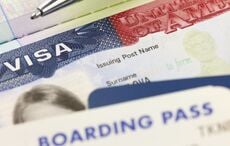Passengers from all international destinations must produce a negative result to help protect against rising infection rates and new variants of coronavirus circulating internationally, Northern Ireland's Department of Health said in a statement.
According to Northern Ireland's Department of Health, international travelers will be required to provide proof of a negative Covid-19 test result, taken within the 72 hour period before departure, to their transport operator. Travel operators will be committing an offense if they permit travel without the necessary proof a negative test, with fines up to £10,000.
The test should take place in the departure country. If a traveler arrives in Northern Ireland without the necessary proof of a negative test, and without a reasonable excuse, they will be fined. Fines starting at £500 will be levied on non-compliant passengers.
Minimum testing and certification, along with the information that you will be required to present, will be set out in the legislation. It is the responsibility of travelers to find a test provider and to ensure that tests meet the standards for pre-departure testing.
There will be some very limited exemptions from the need for testing which will be set out in the legislation.
Robin Swann, Northern Ireland's Health Minister, said: "This additional measure will provide another layer of protection to help reduce the risk of imported infections, while national lockdown and vaccination take effect.
"The move is in addition to other robust existing measures such as the removal of travel corridors and the self-isolation requirement regardless of the pre-departure test result."
In the Republic of Ireland, similar measures were announced on January 13 and enacted on January 16.
Also on January 17, Northern Ireland's Department of Health announced that travelers who arrived from the following South American countries in the last 14 days must self-isolate for 10 days when they arrive in Northern Ireland, their household must also isolate for 10 days.
- Argentina
- Brazil
- Bolivia
- Chile
- Cape Verde
- Colombia
- Ecuador
- French Guiana
- Guyana
- Paraguay
- Panama
- Portugal
- Peru
- Suriname
- Uruguay
- Venezuela
A Departmental spokesperson said: “This precautionary measure is in response to the emergence of Covid-19 variants in these countries. Work is ongoing to understand the effect of the variants on disease characteristics such as transmissibility.”




Comments